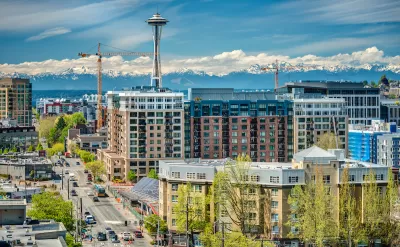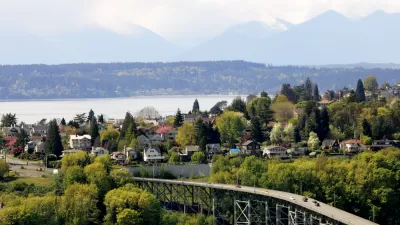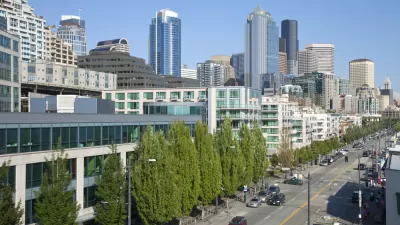An update to the city’s comprehensive plan will reduce, but not fully eliminate, parking mandates for housing developments.

Seattle intends to maintain minimum parking requirements in much of the city, even as it has reduced other restrictions on new housing construction, reports Ryan Packer in The Urbanist.
“The fact that the City of Seattle intends to keep parking mandates that could impede housing growth was a footnote as the City released new zoning maps last month, as part of the latest update to Bruce Harrell’s One Seattle Comprehensive Plan.” Yet the city has led the way on parking reform in the past, eliminating parking mandates near transit in 2012.
The updated rules would lower requirements to one stall per every two housing units. “This would apply to the city’s new middle housing regulations, which are set to allow four to six units on all lots across the city, but also to the 30 new “neighborhood centers” proposed, which include places like Tangletown, North Magnolia, and central Beacon Hill, where more units would be allowed.”
According to Matt Hutchins, founding principal at CAST Architecture, “The difference between having zero parking spaces and having one parking space might be that there’s 1,000 square feet of extra paved area.” Hutchins told The Urbanist, “It has an outsized effect. And many, many places have demonstrated that that [sic] not requiring parking doesn’t mean that developers won’t provide it when they can or want to.”
FULL STORY: Seattle Set to Double Down on Arbitrary Parking Mandates

Study: Maui’s Plan to Convert Vacation Rentals to Long-Term Housing Could Cause Nearly $1 Billion Economic Loss
The plan would reduce visitor accommodation by 25,% resulting in 1,900 jobs lost.

Alabama: Trump Terminates Settlements for Black Communities Harmed By Raw Sewage
Trump deemed the landmark civil rights agreement “illegal DEI and environmental justice policy.”

North Texas Transit Leaders Tout Benefits of TOD for Growing Region
At a summit focused on transit-oriented development, policymakers discussed how North Texas’ expanded light rail system can serve as a tool for economic growth.

Paris Bike Boom Leads to Steep Drop in Air Pollution
The French city’s air quality has improved dramatically in the past 20 years, coinciding with a growth in cycling.

Why Housing Costs More to Build in California Than in Texas
Hard costs like labor and materials combined with ‘soft’ costs such as permitting make building in the San Francisco Bay Area almost three times as costly as in Texas cities.

San Diego County Sees a Rise in Urban Coyotes
San Diego County experiences a rise in urban coyotes, as sightings become prevalent throughout its urban neighbourhoods and surrounding areas.
Urban Design for Planners 1: Software Tools
This six-course series explores essential urban design concepts using open source software and equips planners with the tools they need to participate fully in the urban design process.
Planning for Universal Design
Learn the tools for implementing Universal Design in planning regulations.
Smith Gee Studio
Alamo Area Metropolitan Planning Organization
City of Santa Clarita
Institute for Housing and Urban Development Studies (IHS)
City of Grandview
Harvard GSD Executive Education
Toledo-Lucas County Plan Commissions
Salt Lake City
NYU Wagner Graduate School of Public Service





























